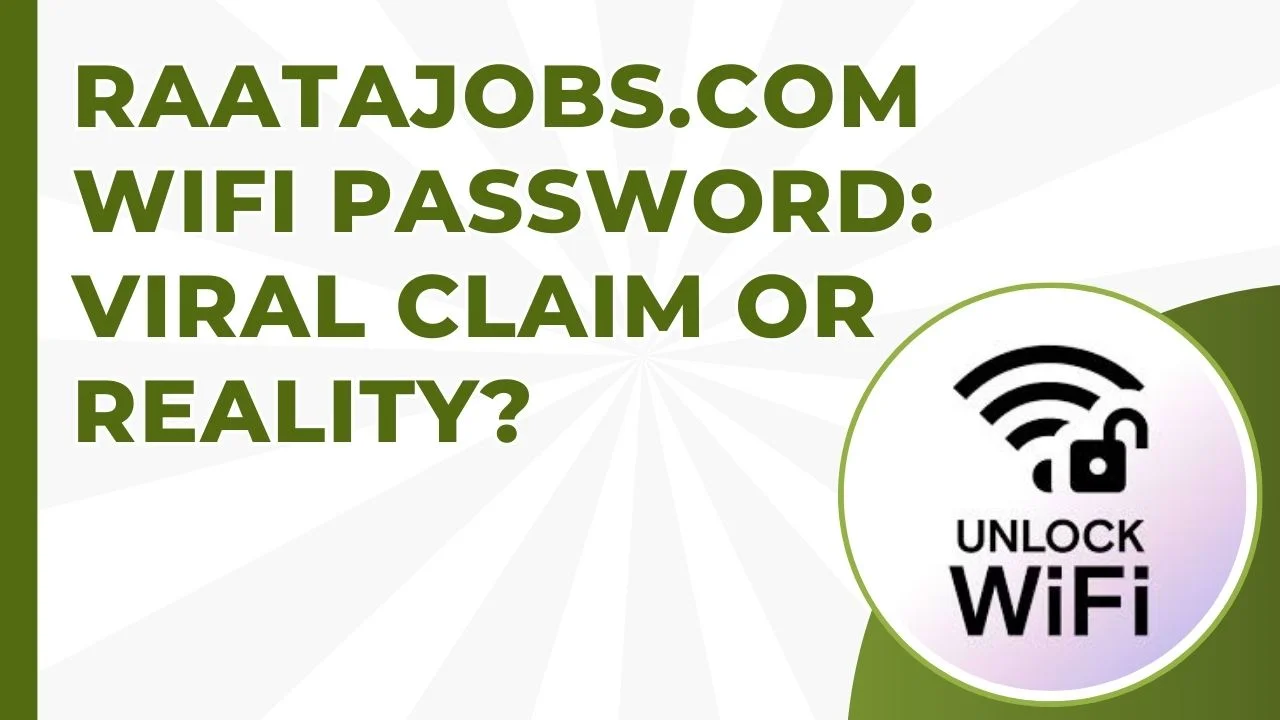Raatajobs is often mentioned in online searches and discussions as a platform that supposedly offers free WiFi passwords or services to unlock WiFi networks without authorization. However, it’s crucial to approach such claims with caution. Websites or apps promising “free WiFi passwords” generally lack credibility and can pose serious security and legal risks. In this article, we will explore what Raatajobs claims, why free WiFi password offers are risky, and what you should do instead.
Raatajobs WiFi Password
Raatajobs is rumored to be a platform that provides users with access to free WiFi passwords or methods to hack into secured WiFi networks. It is often grouped with websites and apps that promote unauthorized access to private networks. However, there is no credible evidence that Raatajobs provides a genuine or legal way to obtain WiFi passwords.
How Do Raatajobs WiFi Password Hacking?
Websites and apps that claim to offer free WiFi passwords typically use dubious tactics to deceive users:
- False Claims and Fake Promises: These sites often promise to crack WiFi passwords with a few clicks. However, such claims are mostly fabricated.
- Malware Distribution: Many of these sites are designed to spread malware or spyware onto your device when you attempt to download their “password unlocking” software.
- Scam Tactics: These sites often ask users to fill out fake surveys, download unnecessary apps, or provide personal information before they supposedly “reveal” the WiFi password. In reality, this information is collected for scams or identity theft.
Why Free WiFi Password Claims are Risky
- Security Threats: Accessing WiFi networks through unauthorized means or downloading tools from unverified websites can expose your device to malware, spyware, or other harmful programs.
- Legal Consequences: Hacking or attempting to hack WiFi networks without permission is illegal in most regions and could result in fines, criminal charges, or even imprisonment.
- Data Theft: Websites or apps claiming to provide free WiFi passwords often ask for personal information or permission to access files and media on your device, which can result in your data being stolen or misused.
The Reality of Unlocking WiFi Networks
WiFi networks are secured with encryption protocols like WPA2 and WPA3, which are designed to protect network access from unauthorized users. Although some old and weak networks may be vulnerable to attacks, modern encryption makes it nearly impossible to access WiFi without a password.
How to Secure Your WiFi Network
Here are some effective ways to secure your WiFi network:
- Strong Passwords: Use a strong and complex password with a combination of letters, numbers, and special characters.
- Encryption: Ensure your WiFi router uses WPA3 (if available) or WPA2 encryption for added security.
- Monitor Connected Devices: Regularly check the devices connected to your network using your router’s control panel. If you see unauthorized devices, block them immediately.
- Router Firmware Updates: Keep your router firmware up to date to protect against security vulnerabilities.
Safe and Ethical Ways to Connect to WiFi
If you need to connect to WiFi, it is always better to follow ethical and secure methods:
- Ask for Permission: Politely ask the owner of the WiFi network for access if you need to connect. Most people are willing to share their network if you have a legitimate reason.
- Look for Public Networks: Many businesses offer guest WiFi or public networks that are free to access. Make sure to use a VPN when connecting to public WiFi for added security.
- Use WiFi-Sharing Apps: Some apps provide a database of voluntarily shared WiFi passwords. Make sure to use these apps within the bounds of legality and with permission from the network owners.
FAQs
Q1: Can Raatajobs provide free WiFi passwords?
No, there is no reliable evidence that Raatajobs can provide legitimate WiFi passwords. Websites making such claims are often scams or sources of malware.
Q2: Is it legal to hack WiFi networks?
No, hacking into WiFi networks without permission is illegal and can lead to fines, criminal charges, or legal consequences.
Q3: How can I protect my WiFi network from hackers?
Use a strong password, enable WPA3 or WPA2 encryption, monitor connected devices regularly, and update your router’s firmware frequently.
Q4: Are there safe ways to connect to a WiFi network without a password?
The only safe and legal way to connect to a WiFi network is by asking the owner for permission or using a publicly accessible network.
Q5: What should I do if I suspect my WiFi network has been hacked?
Change your WiFi password immediately, update your router’s firmware, and review connected devices to remove any unauthorized users.
Conclusion
While the idea of free WiFi access may be tempting, it’s essential to avoid risky methods or unreliable websites like Raatajobs. Prioritizing security and legality is the key to staying safe online. Whether you are using a public WiFi network or connecting to a private one, always ask for permission and use strong security practices to protect your data.
Instead of looking for shortcuts, focus on securing your own WiFi network and following ethical practices when connecting to networks. By doing so, you can enjoy a safer online experience without falling victim to scams or legal issues.
